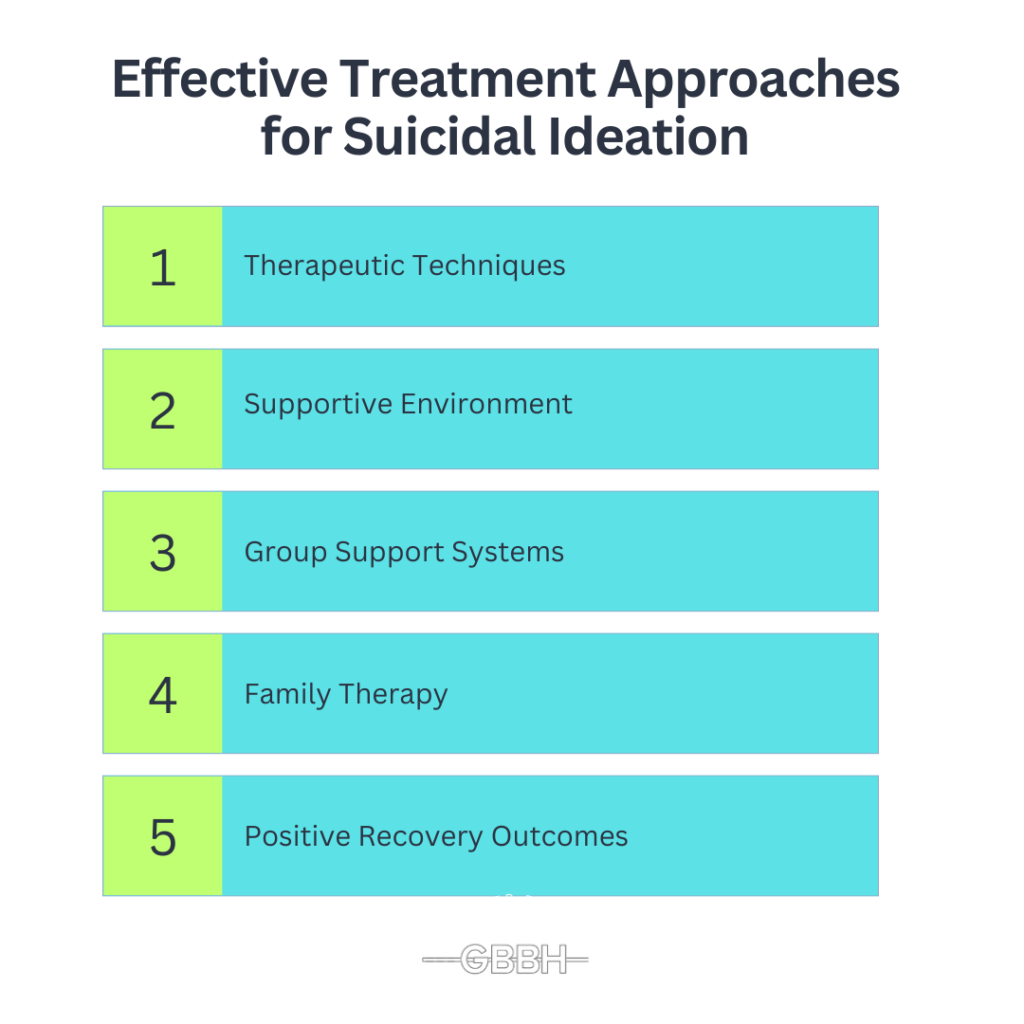Suicidal ideation refers to thoughts about, plans for, or fantasies of ending one’s own life. This can range from fleeting thoughts about death to detailed planning of how to commit suicide. These thoughts can arise from various emotional, psychological, or situational stressors, often indicating an underlying mental health condition. At Greater Boston Behavioral Health, we understand the urgency of addressing suicidal ideation and offer a variety of mental health treatment programs aimed at providing immediate and effective support.
The Complexity of Suicidal Ideation
Suicidal ideation is often not a straightforward path. It can be influenced by a myriad of factors including:
- Mental Health Disorders: Conditions such as depression, anxiety disorders, bipolar disorder, and PTSD frequently contribute to suicidal thoughts. Understanding how these disorders interplay with suicidal ideation is crucial for effective treatment.
- Situational Triggers: Major life changes, such as the loss of a loved one, a relationship breakdown, or financial distress, can act as catalysts for these thoughts.
- Cultural and Societal Factors: Social isolation, stigma around mental health, and cultural attitudes towards suicide can significantly impact how individuals express and cope with their feelings.
Recognizing these complexities helps to create a holistic treatment plan that addresses not just the symptoms of suicidal ideation, but also the root causes.
Signs and Symptoms of Suicidal Ideation
Identifying suicidal ideation is critical for timely intervention. Here are some detailed signs and symptoms to be aware of:
- Verbal Cues: Phrases such as “I can’t take this anymore,” or “I wish I could go to sleep and never wake up,” are direct signals that someone may be struggling. Pay attention to both direct and indirect expressions of despair.
- Behavioral Changes: Sudden shifts in behavior, such as increased withdrawal from friends and family, or a marked decline in performance at work or school, can indicate distress. People might also engage in reckless behaviors as a cry for help.
- Mood Instability: Frequent mood swings can be a sign of underlying turmoil. Look for shifts from deep sadness to sudden calmness, which might indicate the person has resolved to act on their thoughts.
- Increased Substance Use: Escalating use of drugs or alcohol can be a coping mechanism for emotional pain and significantly raises the risk of suicidal ideation.
- Obsessive Thoughts About Death: This can manifest as frequent discussions about death, obsessive reading or writing about death, or a fascination with lethal means.
- Physical Symptoms: Changes in sleep patterns (insomnia or hypersomnia) and appetite (eating too much or too little) are common physical manifestations of mental distress that can accompany suicidal thoughts.
Risk Factors for Suicidal Ideation
Understanding the risk factors that may contribute to suicidal ideation can help in prevention:
- Previous Attempts: A history of prior suicide attempts significantly increases the risk of future attempts.
- Mental Health Disorders: Conditions like major depressive disorder, anxiety disorders, and borderline personality disorder are closely linked to suicidal ideation.
- Trauma and Abuse: Past trauma, whether physical, emotional, or sexual, can leave individuals vulnerable to suicidal thoughts.
- Chronic Illness: Long-term health conditions can lead to feelings of hopelessness and isolation, increasing the risk of suicide.
- Social Isolation: A lack of social support can exacerbate feelings of hopelessness and despair.
Coping Mechanisms: How People Manage Suicidal Thoughts
Understanding the ways individuals cope with suicidal ideation can provide insight into treatment and support:
- Positive Coping Strategies: Some may engage in healthy coping mechanisms like physical exercise, creative outlets (art, music), or talking with friends and family.
- Negative Coping Strategies: Unfortunately, others might turn to self-destructive behaviors, such as substance abuse or self-harm, as a way to escape their feelings.
Recognizing these coping strategies is vital for developing effective treatment plans and supporting individuals in choosing healthier alternatives.
Treatment Approaches for Suicidal Ideation
At Greater Boston Behavioral Health, we provide a range of effective treatment options to help individuals facing suicidal ideation:
- Cognitive-Behavioral Therapy (CBT): This evidence-based therapy focuses on changing negative thought patterns and behaviors. By helping individuals recognize distorted thinking, Cognitive-Behavioral Therapy empowers them to develop healthier coping strategies and reduce feelings of hopelessness.
- Dialectical Behavior Therapy (DBT): Particularly effective for individuals experiencing intense emotions, Dialectical Behavior Therapy combines cognitive-behavioral techniques with mindfulness practices. It equips individuals with tools to manage emotional distress, improve relationships, and increase overall emotional resilience.
- Intensive Outpatient Program (IOP): For those needing more structured support, Intensive Outpatient Program offers multiple weekly sessions of therapy while allowing clients to return home each day. This program is ideal for individuals who require close monitoring and support but do not need round-the-clock care.
- Outpatient Therapy: Regular sessions with trained professionals provide ongoing support for individuals navigating their mental health challenges, making therapy accessible and flexible.
Crisis Management: Immediate Steps to Take
If you or someone you know is experiencing suicidal thoughts, it’s crucial to take immediate action:
- Talk About It: Encourage open discussions about feelings. Often, just having someone to listen can be incredibly relieving.
- Seek Professional Help: Reach out to a mental health professional. At Greater Boston Behavioral Health, our Mental Health Treatment Center in Massachusetts offers immediate support and guidance through various treatment programs.
- Crisis Hotlines: If you are in crisis, contacting a suicide prevention hotline can be a critical step. Trained professionals can provide support and resources.
- Remove Means of Harm: If possible, eliminate access to means that could facilitate suicide, such as medications, weapons, or sharp objects.
Supporting Someone with Suicidal Ideation
If a loved one is showing signs of suicidal ideation, your support can make a profound difference:
- Be Present: Sometimes, just being there and offering a listening ear can provide immense comfort.
- Encourage Professional Help: Gently suggest they talk to a mental health professional. Offer to help them find resources or even accompany them to appointments.
- Educate Yourself: Understanding the signs, symptoms, and risk factors associated with suicidal ideation can empower you to provide better support.
- Practice Self-Care: Supporting someone in distress can be emotionally taxing. Ensure you are taking care of your own mental health as well.
Conclusion
Suicidal ideation is a serious mental health concern that requires immediate attention and intervention. Recognizing the signs and symptoms can save lives, and seeking professional help is crucial. At Greater Boston Behavioral Health, we are dedicated to providing compassionate care through our comprehensive Mental Health Programs. If you or someone you know is struggling with suicidal thoughts, reach out to our Mental Health Treatment Center in Massachusetts for immediate support and guidance on the path to recovery. Call us at: (888)278-0716 today for more info.
Frequently Asked Questions About Suicidal Ideation
What are the common signs of suicidal ideation?
Common signs include verbal expressions of hopelessness, withdrawal from social activities, mood swings, obsession with death, changes in sleep and appetite, and engaging in risky behaviors. If you notice these signs in yourself or someone else, it’s important to seek help.
What are the risk factors for suicidal ideation?
Risk factors include mental health disorders (such as depression and anxiety), a history of previous suicide attempts, trauma or abuse, chronic illness, substance abuse, and social isolation. Understanding these factors can aid in prevention efforts.
How can I help someone experiencing suicidal thoughts?
Encourage open communication and offer your support. Suggest they seek professional help from a mental health provider. If necessary, remove any means that could be used for self-harm. Your presence and understanding can make a significant difference.
What treatment options are available for suicidal ideation?
Treatment options include Cognitive-Behavioral Therapy (CBT), Dialectical Behavior Therapy (DBT), Intensive Outpatient Programs (IOP), and regular outpatient therapy. At Greater Boston Behavioral Health, we offer a range of tailored programs to support individuals in distress.
Is suicidal ideation common?
Many people experience suicidal thoughts at some point in their lives, especially during periods of intense stress or emotional pain. However, it’s important to take these thoughts seriously and seek help.


